
5 ways to be independent as a disabled person
Victor Hugo once said, “Nothing is stronger than an idea whose time has come.” The big idea is that we, as disabled people, have the power to make changes that will help us live more independently without waiting for society in general to change. But, unfortunately, this takes work.
Rate it! is here to help, offering disabled and older people a space to share their views and reviews of products that can help make life that little bit easier. Here, Laura Horton, a Rate it! partner, shares the five Rs that can help you live independently.
1. Representation of disabled people
This is the fundamental idea that we represent ourselves. However, we have to continue to convince others about this. We have to argue from the viewpoint of the social model of disability. This attests that people with impairments are ‘disabled’ by the barriers in society that exclude and discriminate against us.
Mike Oliver, the first Professor of Disability Studies in the UK, who died in March, unceasingly promoted the Social Model of Disability throughout his work and life.
A wheelchair user from the age of 17, Mike wrote some seminal books on the subject, including:
- Social Work with Disabled People (1983)
- The Politics of Disablement (1990)
- The New Politics of Disablement (2012 with Colin Barnes).
But we still need to repeat that it is structural barriers, such as a lack of wheelchair ramps or a failure to provide sign language interpreters, that impedes disabled people, rather than our impairments.
An ableist society is what disables disabled people. To win full access and inclusion in society we need to continually use this idea in all our arguments.
Understand more about the social model of disability by reading Disability Horizons’ article on Social Model of Disability.
I work for Leicestershire Centre for Integrated Living (LCIL) a DPULO (disabled people’s user-led organisation) that uses the social model of disability. We support disabled people at a local, regional and national level to exercise choice and control for independent living.
As a user-led organisation, we’re run and controlled by disabled people. Our disability services empower disabled people and their families, friends and organisations to respond to disability and equality issues in a positive way. We work to improve independence, inclusion and equality for disabled people.
2. Rip-off world of specialist disability products
We all, as disabled people, pay too much money for products. On average, disabled people spend £583 per month on the extra costs of day-to-day living, according to the Extra Costs Commission report. We have to pay for specialist goods and services – and don’t we just know it!
We may need to buy equipment, such as wheelchairs or mobility scooters, screen readers, stairlifts, a hoist for our car or a wheelchair-accessible vehicle. Or we might need adaptations to our homes to make them accessible, specialist hearing aids or adaptations for communication.
We also spend more on non-specialist goods and services. A third of disabled people in the UK spend significantly more on their energy bills. And we use taxis more often than non-disabled people.
3. Research
We all have to do research to find products and services to make independent living easier. But we can help each other to choose products which can best fit our needs and our budgets.
And no-one wants to buy something that doesn’t work as well as it should. So make sure you do your research before you buy!
Some useful independent websites that provide high-quality information and help include:
- The Research Institute for Disabled Consumers (RiDC) – a charity that’s a leading expert in user-centred research involving disabled and older consumers in the UK. It also has an active consumer research panel.
- Living Made Easy – a trusted website designed and run by the Disabled Living Foundation (DLF). It provides advice for disabled adults and children, older people, and their families and carers, about equipment to make everyday tasks easier.
- Youreable.com – an online community of and for disabled people (also run by DLF) with specialist forums on benefits, motoring, health, travel, work, parenting and gardening, as well as surveys, research requests and TV programmes. Well worth a visit!
If you can’t find products on the high street to suit you, the two UK charities listed below have product solutions they’ve developed for people in the past:
- Remap works with local groups of skilled volunteers to help disabled people achieve independence by designing and making equipment for their individual needs.
- Demand – Design and Manufacture for Disability offers a range of services in the UK to help more disabled people to live as fully as possible. It offers custom designs and refurbishments of kits.
4. Review disability aids
What’s the main way in which people do research? By reading reviews. But unless someone writes those reviews, there won’t be any. This is where you can really help other disabled people.
Share your knowledge and experience of products you’ve used at Rate it! – product reviews by and for disabled people!
5. Remember your disability rights
We all need to check out our rights – find out more from Disability Rights UK.
More seriously, though, protect yourself from disability hate crimes. Learn more from Stop Hate UK, which is working to challenge all forms of hate crime and discrimination based on any aspect of an individual’s identity.
Finally, and on a boring level, when you’re buying expensive equipment – or everyday goods – make sure you know your rights so that you don’t get ripped off with a product that doesn’t do what it’s supposed to, or breaks easily. Find out more about your UK consumer rights.
Remember the five Rs to help you live independently.
By Laura Horton
More on Disability Horizons…